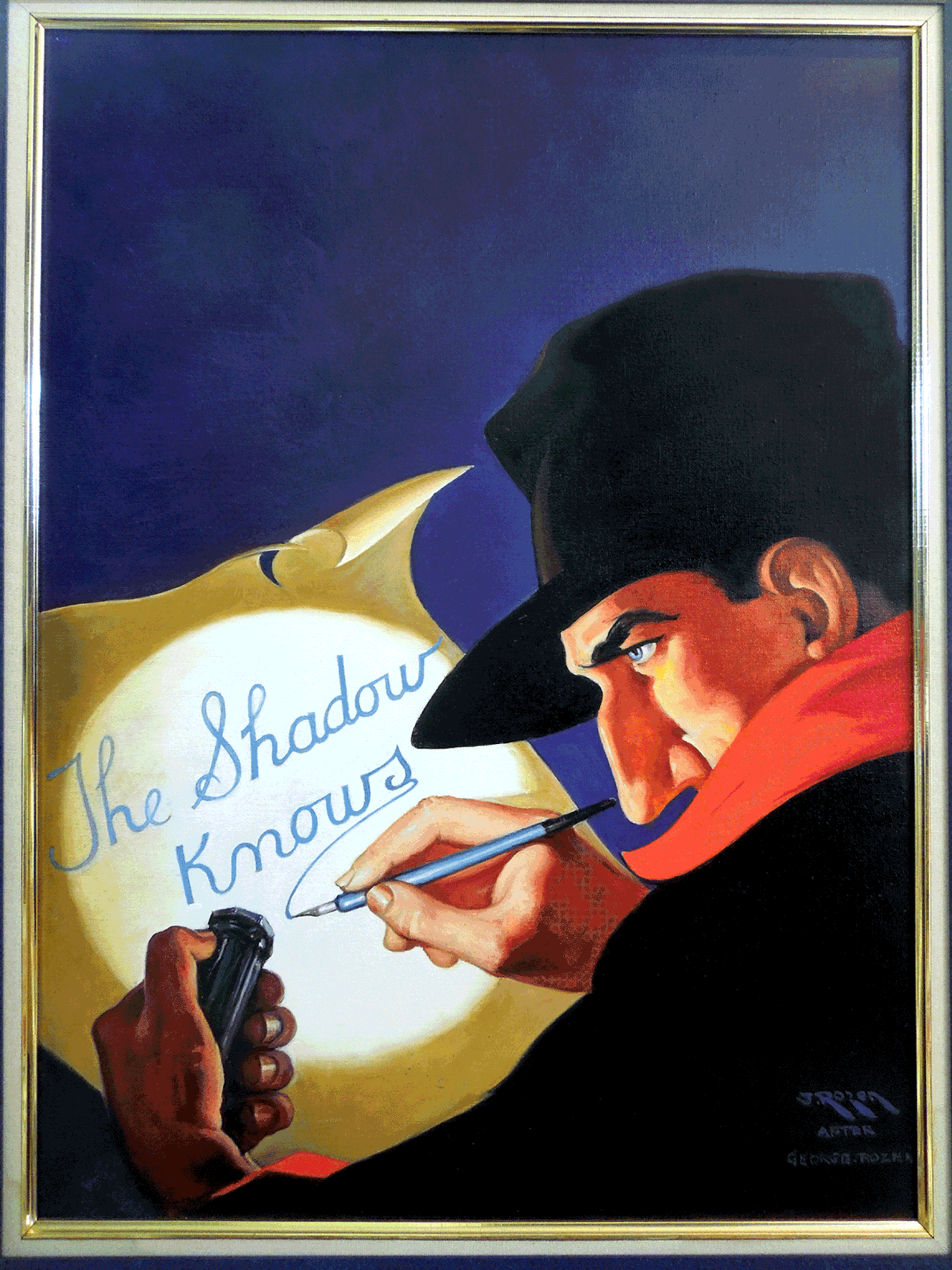Continued from our last thrilling episode (3/21/23):

During the height of the Great Depression, Street & Smith, a leading publisher of pulp fiction, decided to launch a radio drama to promote their Detective Story Magazine. But their marketing strategy yielded unexpected and unusual results: the show’s mysterious announcer, the Shadow, quickly became the most popular aspect of the weekly broadcasts. So, instead of listeners flocking to newsstands to purchase Detective Story, they went searching for “that Shadow mystery magazine.”
Street & Smith didn’t publish such a pulp. Furthermore, the company thought it had finished with magazines featuring a single continuing character. But Street & Smith wasn’t about to let a golden opportunity slip by. The publisher quickly decided to go with the flow and give readers what they wanted. Only one problem: at the time, the Shadow was nothing more than a sinister-sounding voice on the airwaves — accompanied by a bone-chilling laugh. Who was this man of mystery?
Enter Walter Gibson, a young and, as it turned out, extremely prolific writer. Gibson (1897-1985) had been a carnival magician, then a Philadelphia newspaperman, and was currently ghostwriting books for the greatest magicians of his day, including the legendary escape artist
Howard Houdini. When he arrived at the New York offices of Street & Smith to propose an idea he had for a new literary project, the editors waylaid the writer with an unexpected and unusual opportunity: We’re not sure who or what this mystery man is, or from where he came, but we need you to pen a Shadow novel — and we need it quick!
Gibson decided to go with the flow. He went home and quickly outlined the entire novel; and after a few days, he’d already finished the first 3 or 4 chapters. Then he received a call from an editor at Street & Smith, a potentially aggravating and frustrating call! The publisher wanted to get their new mystery pulp on the streets as soon as possible, so there wasn’t enough time to commission a cover painting for the novel. But, heh, the publisher had an unused piece of cover art already on file, which prominently featured a Chinese character. “So, Mr. Gibson, can you put a Chinese guy into your novel?”
The writer could have fumed, “Why didn’t you ask me that to start with?!?” Instead, he simply shrugged and got back to work. Gibson’s mind was made up; he’d gone with the flow. He added the requisite Asian plot elements — which he quickly realized added greatly to the story — and continued pounding the typewriter keys until he’d produced the pulp novel The Living Shadow. This impromptu novel introduced the now-legendary master sleuth who waged an unending war on everything from phony spiritualists to corrupt politicians to the evil lords of the criminal underworld; the wealthy Lamont Cranston by day, a cloaked figure by night, adept at magic and hair-raising escapes!
 Gibson’s novel, written under the house name of Maxwell Grant, appeared in early 1931, in the first issue of The Shadow Magazine. The new pulp sold out almost immediately, and it wasn’t long before Street & Smith increased its publication to twice a month! Oh, and the publisher insisted that Gibson write all the adventures of his masked avenger!
Gibson’s novel, written under the house name of Maxwell Grant, appeared in early 1931, in the first issue of The Shadow Magazine. The new pulp sold out almost immediately, and it wasn’t long before Street & Smith increased its publication to twice a month! Oh, and the publisher insisted that Gibson write all the adventures of his masked avenger!
Gibson stated, the publisher “asked me to write one a month, and next thing they wanted them twice-a-month. …[So] I just dropped everything else and did the Shadow for 15 years. I was pretty much Depression-proof.” All told, Gibson penned an astounding 282 Shadow pulp novels over the next two decades, and lived quite comfortably while doing so. These books are still popular today, still being devoured by readers, and the Shadow is one of the most iconic, most copied characters of the 20th century! In fact, the Shadow served as the inspiration for another literary cash cow, a certain caped crusader called the Batman!
In Gibson’s case, it paid (literally) to go with the flow, just as Street & Smith had. Of all the numerous books and magazine features the writer produced, the Shadow remains his best-known and most popular work — his great creative legacy. And yet, Gibson could have said “no”; or chosen to write only a few novels featuring the mysterious crime fighter, before moving on to write “the great American novel” or some such nonsense.
In the pursuit of your goals and dreams, and in all of your creative endeavors, whenever you come to a crossroads, or encounter an unusual
and unexpected opportunity, ask God to help you make the right decision. It’s quite possible you’d best be served just going with the flow. After all, who knows what direction good people should take? The Shadow knows! (And  you can trust God to let you in on the secret!)
you can trust God to let you in on the secret!)
“The steps of good men are directed by the Lord. He delights in each step they take. If they fall, it isn’t fatal, for the Lord holds them with his hand.” (Psalm 37:23 TLB)
Next time (Friday), don’t miss the startling true story of a struggling writer who tried to break into the world of pulp fiction — and eventually made a real dent!
